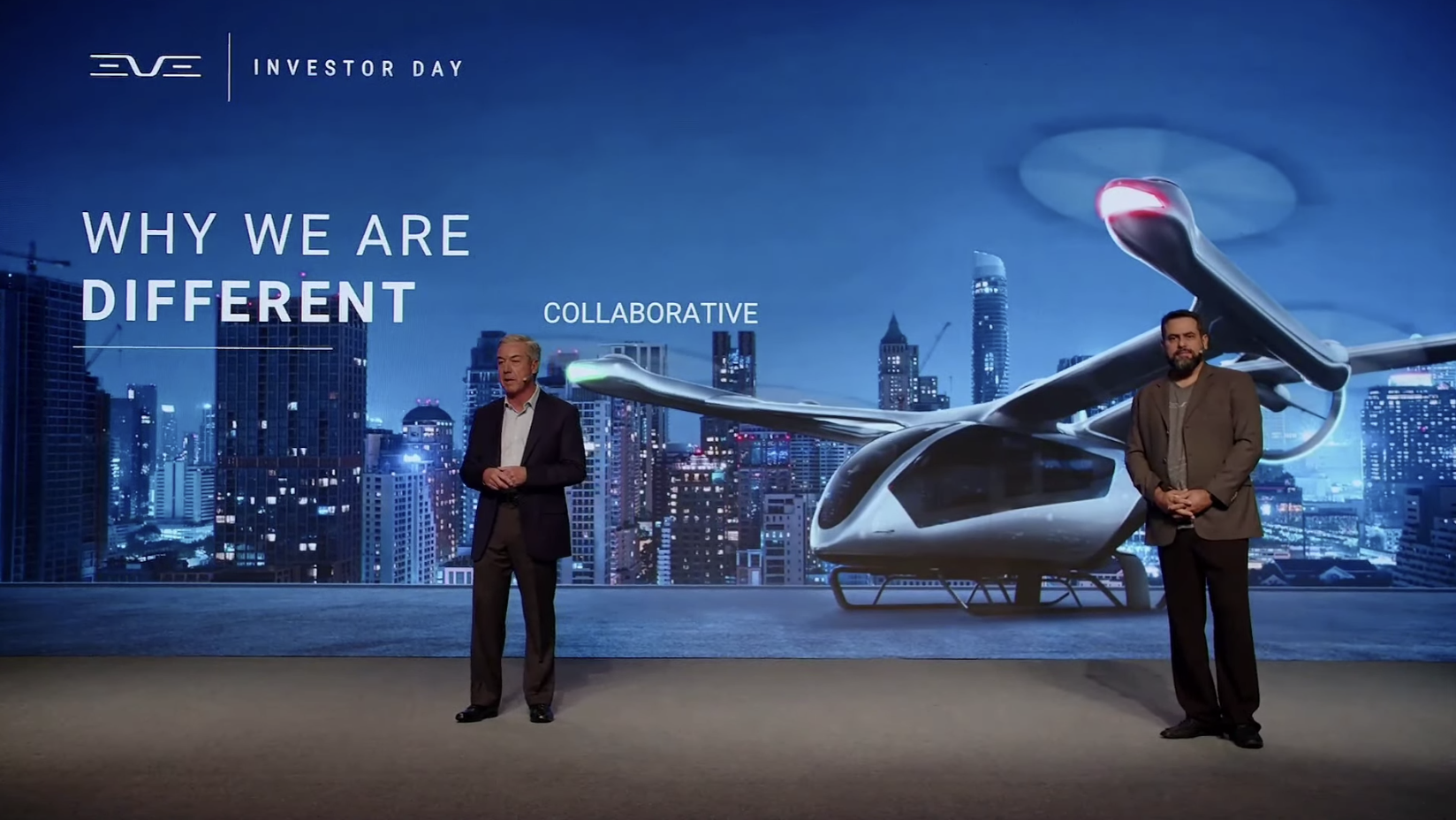Click Here to View This Page on Production Frontend
Click Here to Export Node Content
Click Here to View Printer-Friendly Version (Raw Backend)
Note: front-end display has links to styled print versions.
Content Node ID: 419482
Eve Urban Air Mobility says it now expects to raise well over $500 million from its pending merger with Zanite Acquisition Corporation and a subsequent initial public offering on the New York Stock Exchange. During a March 25 briefing for investors, the eVTOL aircraft developer’s CFO, Eduardo Couto, said that since announcing the deal in December 2021, it has boosted the public investment in private equity (PIPE) by $42 million to $347 million.
The transaction, which is expected to close during the second quarter of this year, is also backed by $237 million in cash from U.S.-based special purpose acquisition company Zanite, which is itself backed by business aviation entrepreneur Kenn Ricci. Couto said that new PIPE backers include Acciona, Thales, and Space Florida and that the capital raised, now potentially totaling $584 million, will derisk Eve’s plans to bring its four-passenger eVTOL aircraft into service during 2026.
Ricci told the event that he and his fellow Zanite investors sought a partnership with the subsidiary of Brazilian aircraft manufacturer Embraer after considering “several dozen” other companies in the advanced air mobility (AAM) sector. He cited the core factors as to why Zanite preferred Eve, starting with the simplicity of its vehicle design, which he claimed will be easier to certify and manufacture, as well as anticipated lower operating costs.
“We also avoided any opportunity where companies wanted to build and operate the aircraft,” Ricci said. “It’s a bridge too far to be both the manufacturer and the airline. You are competing with your own customers and the capital needs to do both are just too high.”
Zanite also values the significant production and global customer support experience of Embraer, which will remain the majority shareholder in Eve with an 82 percent stake. “Likelihood of certification is one thing, but we care more about production,” Ricci commented. “You have to be able to get a production certificate and prove you can build each aircraft to the same standard. We’re more concerned with time to revenues than time to certification, and only Eve and Embraer understand the complications of bringing the aircraft into production.”
Several of Eve’s rivals say they will start commercial operations in 2024, potentially bringing their financial backers an earlier return on their investments. But, countered Ricci, “You don’t have to be first to market—you have to be the best, and the best will be the most successful."
Eve co-CEO Jerry DeMuro, the former CEO of BAE Systems, Inc., who jointly oversees the venture with Andre Stein, said that the 1,785 provisional sales commitments for the all-electric aircraft gathered to date provide “revenue visibility covering the first four years in our business plan.” Stein pointed to a market study that Eve commissioned from KPMG as predicting $31 billion in annual AAM revenues by 2030, rising to $119 billion by 2040.
Eve’s business model envisages ongoing revenues beyond initial aircraft sales from services including maintenance, pilot training, and air traffic management. DeMuro stressed that the company intends to offer support to operators of rival eVTOL aircraft, as well as its own.
The company didn’t directly answer analysts’ question about when it will start testing flying its first full-scale prototype, having told a press conference at February’s Singapore Air Show that this would happen “in the next few months.” Chief technology officer Luiz Valentini stressed that the Eve team has already been busy advancing its plans. “Early on, we need to develop the correct building blocks, and we’re focusing on these with several test articles, including some [sub-scale] flying vehicles but also a wind tunnel, simulator, and [ground-based] testing rigs,” he explained.
Working with prospective aircraft operators and local stakeholders, Eve is developing plans to introduce air taxi services to markets such as the greater Miami area, where Stein said the eVTOL vehicle could replace a 45- to 90-minute drive to South Beach with just a seven-minute flight. In New York City, he sees eVTOL flights competing well with ground transportation trips to JFK International Airport that cost between $70 and $100. The eVTOL flights could start at $100 and potentially cost half that amount once the scale of services increases.
